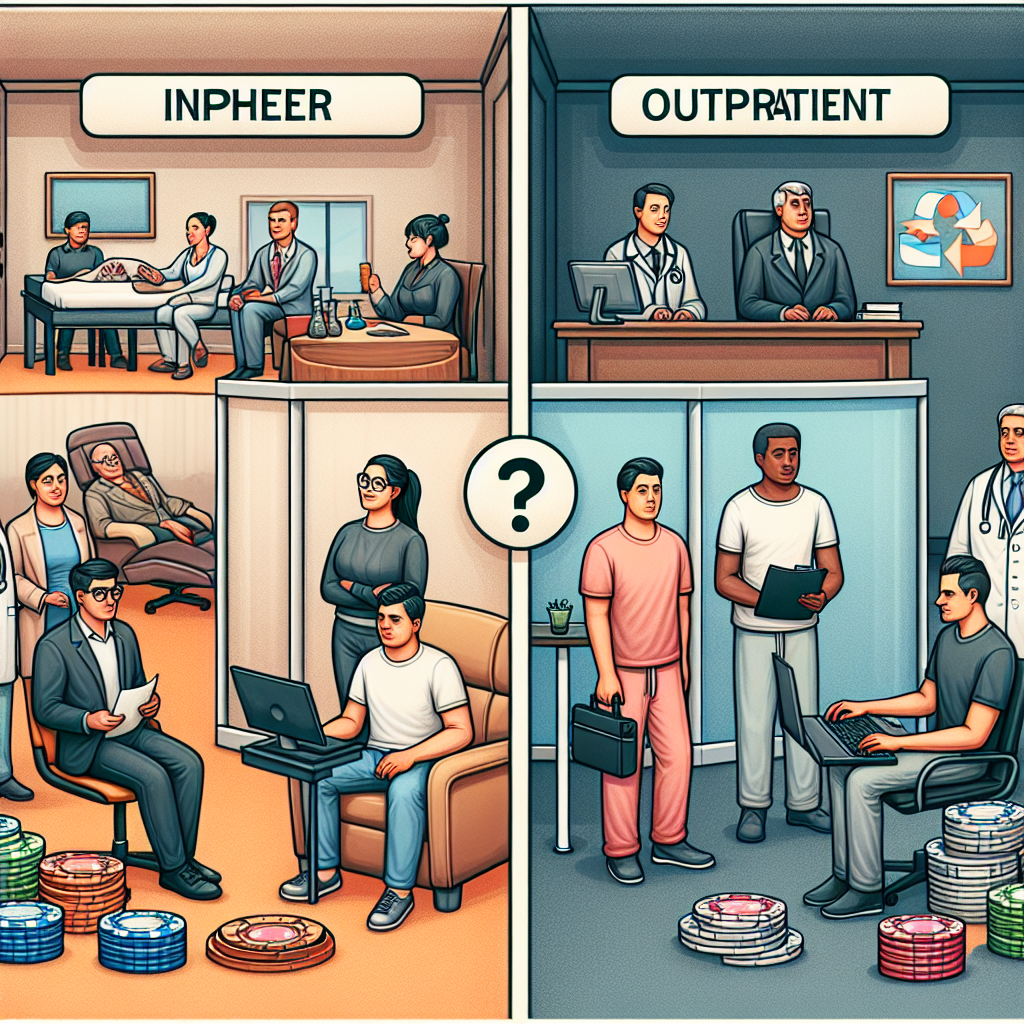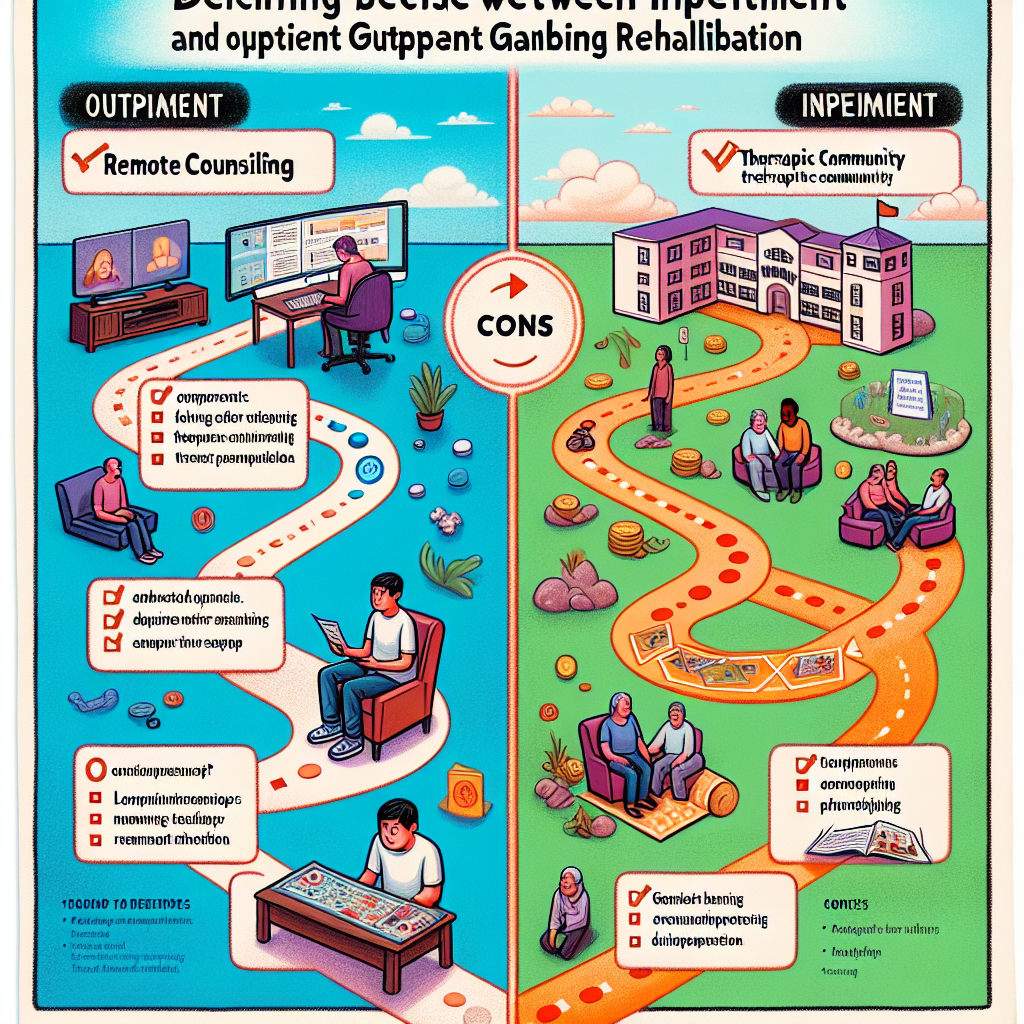-
Table of Contents

“Choose the Right Path: Inpatient vs. Outpatient Gambling Rehab”
Introduction
Deciding between inpatient and outpatient gambling rehab is a critical step in addressing gambling addiction. This decision can significantly impact the effectiveness of the treatment and the individual’s long-term recovery. Inpatient rehab involves staying at a treatment facility for a specified period, providing a structured environment with 24/7 support. It is often recommended for those with severe addiction, co-occurring disorders, or a lack of a supportive home environment. Outpatient rehab, on the other hand, allows individuals to live at home while attending scheduled treatment sessions. This option is suitable for those with milder addiction, strong support systems, and the ability to maintain daily responsibilities. Factors such as the severity of the addiction, personal circumstances, and financial considerations play a crucial role in making the right choice. Understanding the differences and benefits of each type of rehab can help individuals and their families make an informed decision that best supports the path to recovery.
Key Factors to Consider When Choosing Between Inpatient and Outpatient Gambling Rehab
Deciding between inpatient and outpatient gambling rehab can be a pivotal moment in one’s journey toward recovery. Both options offer unique benefits and challenges, and understanding these can help you make an informed decision that aligns with your personal needs and circumstances. The first key factor to consider is the severity of your gambling addiction. Inpatient rehab is often recommended for individuals with severe gambling problems, as it provides a structured environment free from the triggers and temptations of daily life. This immersive approach allows for intensive therapy and constant support, which can be crucial for those who have struggled to maintain control over their gambling habits.
On the other hand, outpatient rehab offers more flexibility, making it a suitable option for those with milder addictions or those who have responsibilities that cannot be put on hold, such as work or family obligations. Outpatient programs typically involve regular therapy sessions and support group meetings, allowing individuals to receive treatment while continuing to live at home. This can be particularly beneficial for those who have a strong support system in place and can manage their triggers with the help of professional guidance.
Another important consideration is the level of support you require. Inpatient rehab provides 24/7 access to medical and psychological support, which can be invaluable for those who need constant supervision and care. This level of support can help prevent relapse and ensure that any co-occurring mental health issues are addressed promptly. Conversely, outpatient rehab relies more on the individual’s ability to seek help when needed and to apply coping strategies learned during therapy sessions. This option can foster a sense of independence and self-reliance, which can be empowering for some individuals.
Financial considerations also play a significant role in the decision-making process. Inpatient rehab tends to be more expensive due to the comprehensive nature of the services provided, including accommodation, meals, and round-the-clock care. However, many insurance plans cover a portion of the costs, and some facilities offer sliding scale fees based on income. Outpatient rehab is generally more affordable, as it does not include the cost of housing and meals. Additionally, the ability to continue working while receiving treatment can help mitigate the financial burden.
The duration of treatment is another factor to weigh. Inpatient programs typically last between 30 to 90 days, providing a concentrated period of time to focus solely on recovery. This can be particularly effective for those who need a break from their everyday environment to reset and develop new habits. Outpatient programs, however, can extend over several months or even years, offering ongoing support and allowing individuals to gradually integrate their new coping strategies into their daily lives.
Ultimately, the choice between inpatient and outpatient gambling rehab should be guided by a thorough assessment of your personal needs, the severity of your addiction, and your support system. Consulting with a healthcare professional can provide valuable insights and help you determine the most appropriate course of action. Remember, the goal is to find a treatment plan that offers the best chance for long-term recovery and personal growth. By carefully considering these key factors, you can take a significant step toward reclaiming control over your life and achieving lasting freedom from gambling addiction.
Pros and Cons of Inpatient vs. Outpatient Gambling Rehabilitation Programs
Deciding between inpatient and outpatient gambling rehabilitation programs can be a pivotal moment in one’s journey toward recovery. Each option offers unique advantages and potential drawbacks, and understanding these can help individuals make an informed choice that best suits their needs. Inpatient rehabilitation programs, often referred to as residential treatment, provide a structured environment where individuals can focus entirely on their recovery. One of the primary benefits of inpatient rehab is the immersive nature of the treatment. By removing individuals from their everyday environments, these programs eliminate many of the triggers and temptations that can lead to gambling. This separation can be particularly beneficial for those who have struggled to maintain control over their gambling habits in the past. Additionally, inpatient programs offer round-the-clock support from medical professionals and counselors, ensuring that help is always available when needed.
However, the intensive nature of inpatient rehab can also be a drawback for some. The commitment required—often 30, 60, or 90 days—can be challenging for individuals with significant personal or professional responsibilities. Moreover, the cost of inpatient treatment can be prohibitive, as it typically includes accommodation, meals, and comprehensive care. Despite these challenges, the structured environment and constant support can make inpatient rehab a highly effective option for those with severe gambling addictions.
On the other hand, outpatient rehabilitation programs offer a more flexible approach to recovery. These programs allow individuals to continue living at home and maintain their daily routines while attending scheduled therapy sessions. This flexibility can be particularly advantageous for those who have work, family, or other commitments that they cannot put on hold. Outpatient programs also tend to be more affordable than inpatient options, making them accessible to a broader range of individuals.
Nevertheless, the less intensive nature of outpatient rehab can present its own set of challenges. Without the constant supervision and support provided by inpatient programs, individuals may find it more difficult to resist the urge to gamble. The success of outpatient rehab often relies heavily on the individual’s ability to stay motivated and committed to their recovery plan. Additionally, because individuals remain in their everyday environments, they may continue to encounter triggers and temptations that can hinder their progress.
Despite these potential drawbacks, outpatient programs can be highly effective, particularly for those with a strong support system at home and a high level of personal motivation. The ability to integrate therapy and coping strategies into daily life can also help individuals develop long-term habits that support sustained recovery.
Ultimately, the decision between inpatient and outpatient gambling rehab should be based on a thorough assessment of one’s personal circumstances, the severity of the addiction, and the level of support available. Consulting with a healthcare professional or addiction specialist can provide valuable insights and guidance in making this important choice. Both inpatient and outpatient programs have their own unique strengths, and the right choice will depend on the individual’s specific needs and situation.
In conclusion, while both inpatient and outpatient gambling rehabilitation programs offer viable paths to recovery, understanding the pros and cons of each can help individuals make an informed decision. By carefully considering their personal circumstances and seeking professional advice, individuals can choose the program that best supports their journey toward a healthier, gambling-free life.
Q&A
1. **Question:** What are the primary factors to consider when choosing between inpatient and outpatient gambling rehab?
**Answer:** The primary factors to consider include the severity of the gambling addiction, the presence of co-occurring mental health disorders, the individual’s home environment, and their ability to commit to treatment schedules.
2. **Question:** How does the level of support differ between inpatient and outpatient gambling rehab?
**Answer:** Inpatient rehab provides 24/7 support and a structured environment, while outpatient rehab offers more flexibility, allowing individuals to live at home and maintain daily responsibilities but with less intensive supervision.
Conclusion
Deciding between inpatient and outpatient gambling rehab involves evaluating the severity of the addiction, the individual’s personal and professional responsibilities, the need for a structured environment, and the level of support required. Inpatient rehab offers intensive, round-the-clock care and a controlled environment, which is beneficial for severe addictions or those with co-occurring disorders. Outpatient rehab provides more flexibility, allowing individuals to maintain their daily routines while receiving treatment, making it suitable for those with milder addictions or strong external support systems. Ultimately, the choice should be guided by a thorough assessment of the individual’s specific needs and circumstances, often with input from healthcare professionals.



